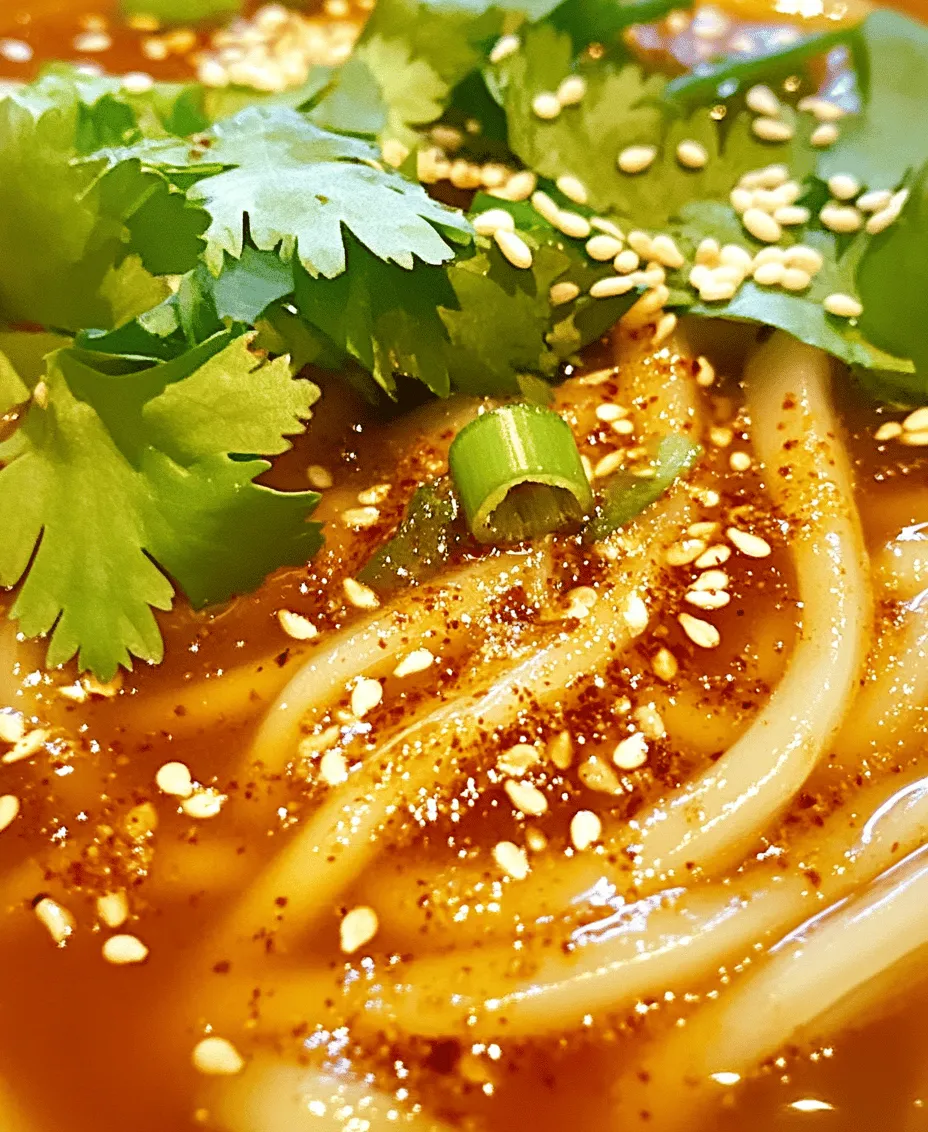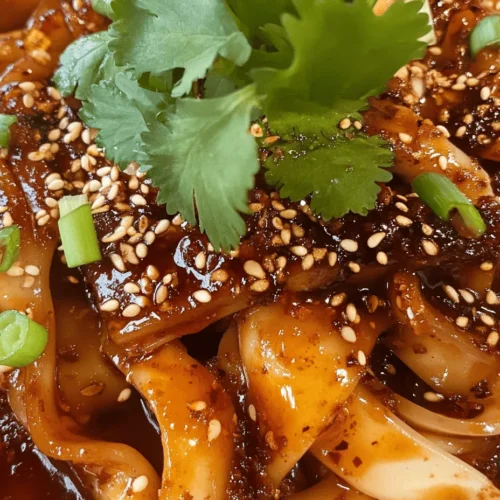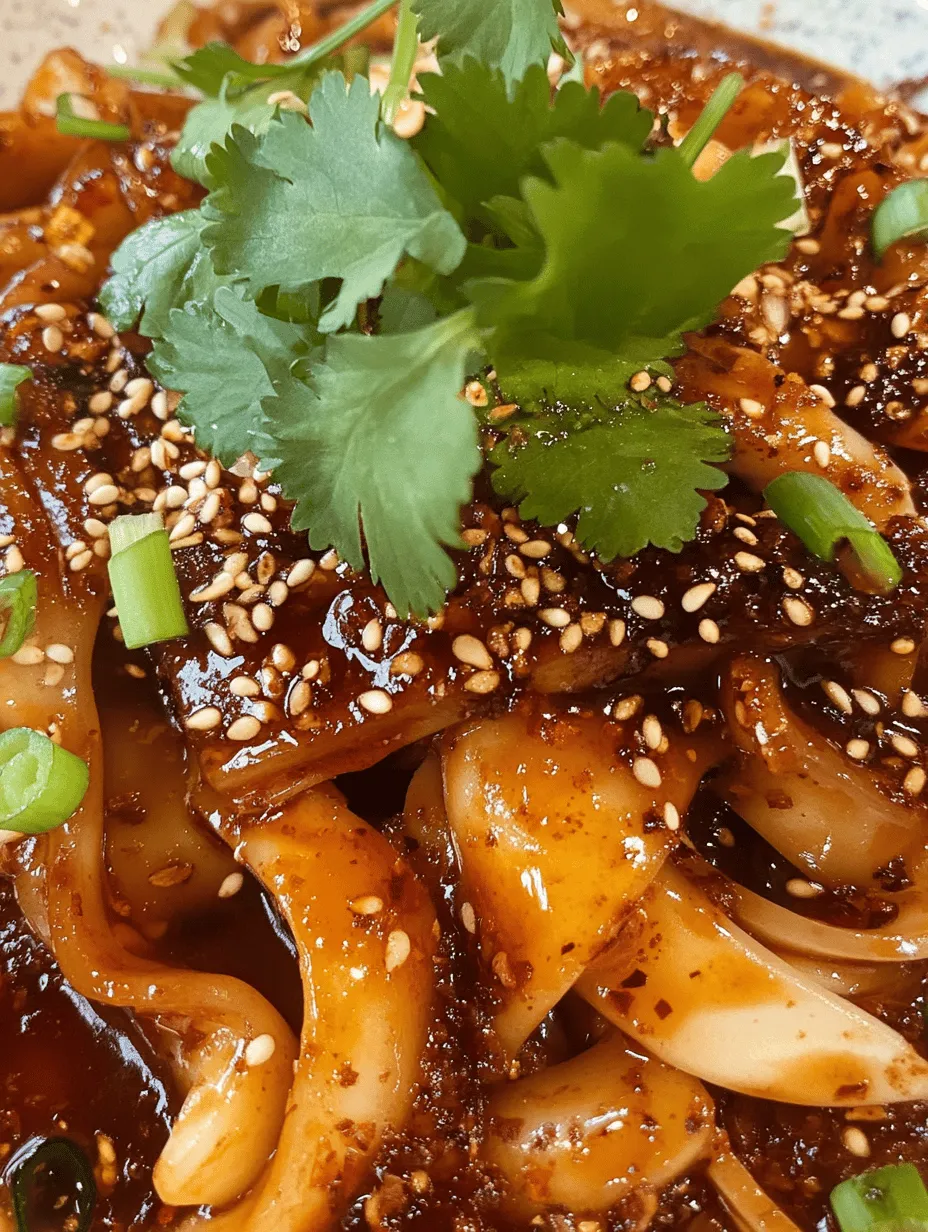In the fast-paced world we live in, quick and delicious meals are essential for anyone looking to maintain a busy lifestyle without sacrificing flavor. One such dish that fits this criterion perfectly is the 10-Minute Chili Oil Udon Noodles. This recipe not only boasts a vibrant mix of flavors but also takes minimal time to prepare, making it ideal for a weeknight dinner or a speedy lunch option. In this article, we will explore the ingredients, preparation methods, and the culinary delights that this simple yet flavorful dish has to offer.
Understanding Udon Noodles
The Origins of Udon Noodles
Udon noodles have a rich history that dates back to ancient Japan, where they were believed to have been introduced by Buddhist monks from China. Initially, udon was made from wheat flour, salt, and water, resulting in a thick, chewy noodle that quickly became popular throughout Japanese cuisine. Over the centuries, udon has evolved, with regional variations emerging that highlight local ingredients and flavors.
Today, udon noodles are enjoyed in myriad forms, from hot soups to cold salads. They can be found in different thicknesses, ranging from the traditional thick udon to thinner versions like hiyamugi. The versatility of udon noodles makes them a favorite among home cooks and professional chefs alike, as they can easily absorb flavors and complement a wide array of ingredients.
Nutritional Benefits of Udon Noodles
Udon noodles are not only delicious but also offer several nutritional benefits. Made primarily from wheat flour, they are a good source of carbohydrates, providing a quick energy boost that is perfect for busy individuals. Udon noodles are typically lower in calories compared to other types of noodles, such as ramen and rice noodles, making them a great option for those looking to maintain a balanced diet.
Moreover, udon noodles contain essential vitamins and minerals, including B vitamins, iron, and magnesium, which are crucial for maintaining energy levels and overall health. When combined with fresh vegetables and protein sources, udon noodles can be part of a well-rounded meal that satisfies both hunger and nutritional needs.
Ingredients Breakdown
Chili Oil: The Flavor Powerhouse
Chili oil is the star of the show in our 10-Minute Chili Oil Udon Noodles. This spicy oil is made by infusing oil with dried chili flakes and other aromatic ingredients, resulting in a flavorful condiment that adds depth and heat to any dish. Originating from various Asian cuisines, chili oil has gained popularity worldwide for its ability to elevate simple dishes into culinary masterpieces.
When preparing chili oil, the type of oil used can significantly affect the flavor profile of the dish. Common oils include vegetable oil, sesame oil, and peanut oil, each bringing its unique taste. Additionally, variations of chili oil can include ingredients like garlic, ginger, and even spices such as Sichuan peppercorns, enhancing the overall complexity of the flavor. For this udon noodle recipe, a balanced chili oil with a moderate level of heat will ensure that the dish is flavorful without overwhelming the palate.
Fresh Ingredients for Maximum Flavor
To achieve the best results in your 10-Minute Chili Oil Udon Noodles, using fresh ingredients is key. Fresh garlic and ginger are essential for creating a robust flavor base that harmonizes beautifully with the chili oil. Garlic adds a savory depth, while ginger provides a warm, spicy note that complements the heat from the chili oil.
Other crucial ingredients include soy sauce, rice vinegar, and sesame oil. Soy sauce not only adds saltiness but also contributes umami, enhancing the overall taste of the dish. Rice vinegar introduces a mild acidity that balances the richness of the oils and the noodles, while sesame oil adds a nutty aroma, tying all the flavors together.
Garnishing for Visual Appeal and Taste
Presentation is an important aspect of any dish, and garnishing plays a vital role in making your 10-Minute Chili Oil Udon Noodles visually appealing. Green onions, sesame seeds, and fresh herbs like cilantro or basil can elevate your dish, adding color and texture while enhancing the flavor.
Green onions bring a fresh crunch and mild onion flavor, while sesame seeds add a nutty element that complements the sesame oil used in the recipe. Fresh herbs can introduce a burst of freshness and complexity, making each bite more enjoyable. Taking the time to garnish your dish not only enhances its visual appeal but also adds layers of flavor that will delight your taste buds.
Step-by-Step Preparation Guide
Boiling Udon Noodles to Perfection
Cooking udon noodles is a straightforward process, but there are a few tips to ensure you achieve the perfect texture. Begin by bringing a large pot of water to a rolling boil. It’s essential to use plenty of water to prevent the noodles from sticking together. Once the water is boiling, add the udon noodles and give them a gentle stir.
Fresh udon noodles typically take about 2-3 minutes to cook, while dried udon noodles may require 8-10 minutes. Follow the package instructions for the specific type you are using. To check for doneness, taste a noodle; it should be chewy yet tender. Once cooked, drain the noodles in a colander, but do not rinse them. Rinsing can wash away the starch that helps the sauce cling to the noodles. Instead, set the drained noodles aside while you prepare the sauce.
Creating the Flavorful Sauce
The sauce for your 10-Minute Chili Oil Udon Noodles is where the magic happens. Start by gathering your ingredients: chili oil, soy sauce, rice vinegar, minced garlic, and grated ginger. In a small bowl, combine these ingredients and whisk them together until well blended. This step is crucial, as it ensures that the flavors meld beautifully, creating a harmonious sauce that coats the noodles.
To balance the flavors, taste the sauce and adjust according to your preference. If you prefer a spicier kick, you can add more chili oil. For a touch of sweetness, consider adding a drizzle of honey or a pinch of sugar. The goal is to create a sauce that has a perfect balance of heat, savory depth, and acidity, enhancing the overall experience of your udon noodles.
By following these steps, you are well on your way to creating a delicious and satisfying meal that can be prepared in just 10 minutes. The vibrant flavors of chili oil, combined with the chewy texture of udon noodles, make this dish a standout choice for anyone looking for a quick and tasty meal. In the next section, we will delve deeper into how to assemble your dish and add those finishing touches that will take your 10-Minute Chili Oil Udon Noodles to the next level.

Coating the Noodles
Once your udon noodles are cooked and drained, the next crucial step is coating them with the delicious chili oil sauce. Tossing noodles efficiently is key to ensuring that every strand is well-coated and bursting with flavor.
Techniques for Tossing Noodles with Sauce Efficiently
1. Use a Large Bowl: Select a large mixing bowl that allows ample space for the noodles. This prevents them from clumping together and makes it easier to toss them with the sauce.
2. Add Sauce Gradually: Instead of pouring all the chili oil sauce at once, add it in increments. Start with a few tablespoons, toss the noodles, and then add more sauce as needed. This method helps you control the amount of sauce used and ensures an even coating.
3. Tossing Method: Use a pair of chopsticks or tongs for tossing. Gently lift and fold the noodles over each other rather than stirring vigorously. This motion mimics a folding action, allowing the noodles to absorb the sauce without breaking.
4. Temperature Matters: For best results, ensure that the noodles are still warm when you coat them with the sauce. Warm noodles absorb flavors better than cold ones, resulting in a more flavorful dish.
5. Final Touch: Once the noodles are thoroughly coated, give them a taste. If you desire more heat or flavor, you can adjust with a splash of soy sauce or an extra drizzle of chili oil.
Serving Suggestions
Plating the Dish
Presentation is key in making your 10-Minute Chili Oil Udon Noodles visually appealing. Here are some tips for plating the dish attractively:
1. Noodle Nest: Use a fork or tongs to twist the noodles into a nest shape on a large plate or bowl. This not only looks elegant but also allows for easier serving.
2. Layering Ingredients: If you’ve added proteins or vegetables, layer them on top of the noodle nest. This adds height and dimension to your dish, making it more visually appealing.
3. Garnishing: A sprinkle of sesame seeds, sliced green onions, or fresh cilantro can elevate the dish. Garnishing not only enhances the flavor but also adds a pop of color, making the meal more inviting.
Accompaniments to Enhance the Meal
Pairing your udon noodles with complementary side dishes or beverages can create a well-rounded meal. Here are some suggestions:
1. Side Dishes: Consider serving a light side salad with sesame dressing or a bowl of miso soup. Both options complement the flavors of the udon noodles without overpowering them.
2. Beverage Pairings: A chilled glass of sake or a refreshing green tea can enhance the dining experience. These beverages bring out the flavors of the meal and provide a soothing contrast to the chili oil.
Customizing Your Chili Oil Udon Noodles
Adjusting Spice Levels
One of the great things about this dish is its versatility when it comes to spice. Here’s how to modify the spiciness to suit your preferences:
1. Start Mild: If you prefer a milder flavor, start with less chili oil in the sauce. You can always add more heat later, but it’s difficult to tone it down once it’s added.
2. Use Additional Spicy Ingredients: If you enjoy a spicy kick, consider adding crushed red pepper flakes, sriracha, or even a splash of hot chili sauce to your sauce mix. These ingredients can be adjusted based on your tolerance for spiciness.
Variations and Add-ins
To make your 10-Minute Chili Oil Udon Noodles even more nutritious and satisfying, consider adding proteins and vegetables:
1. Proteins: Tofu is an excellent vegetarian option that absorbs flavors well. For meat lovers, grilled chicken, shrimp, or beef slices can add heartiness to the dish. Cook your protein of choice separately and toss it in with the noodles just before serving.
2. Vegetables: Incorporating seasonal vegetables can enhance the nutritional value and add color to your dish. Some great options include bell peppers, bok choy, snap peas, or shiitake mushrooms. Sauté them lightly before mixing them into the noodles.
Culinary Tips and Tricks
Efficiency in the Kitchen
1. Prep Ahead: To minimize prep and cooking time, chop and prepare all your ingredients before starting to cook. Having everything ready allows you to focus on the cooking process without interruptions.
2. Batch Cooking: Consider cooking a larger batch of udon noodles at once. You can store leftovers in the refrigerator and toss them with sauce on busy nights.
3. Utilize Kitchen Tools: A high-quality non-stick pan or wok can make cooking quicker and easier, as it reduces the chances of food sticking and burning. Additionally, a sharp knife will make vegetable prep faster and safer.
Storage and Reheating Tips
To ensure that your leftover udon noodles retain their flavor and texture, follow these storage and reheating tips:
1. Storage: Place any leftover noodles in an airtight container and store them in the refrigerator. They can be kept for up to three days.
2. Reheating: When reheating, add a splash of water or broth to the noodles and cover them in a microwave-safe dish. This prevents them from drying out. Alternatively, you can reheat them in a pan over low heat, adding a bit more chili oil to revive the flavors.
Conclusion
The 10-Minute Chili Oil Udon Noodles recipe exemplifies how a few simple ingredients can come together to create a satisfying, flavorful dish in a matter of minutes. This recipe is not only a testament to the beauty of quick cooking but also a celebration of the rich flavors found in Asian cuisine. Whether you are a seasoned cook or a beginner, this dish offers both ease and adventure in the kitchen, allowing you to enjoy a restaurant-quality meal at home with minimal effort.
With its customizable nature, you can tailor the spice levels, add proteins, and incorporate fresh vegetables, making it a versatile choice for any dining occasion. Coupled with thoughtful presentation and delicious accompaniments, this dish promises to impress your family and friends. So, roll up your sleeves, gather your ingredients, and enjoy the process of creating this delightful bowl of udon noodles that is sure to become a staple in your home cooking repertoire.



